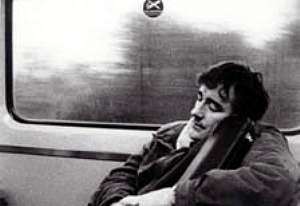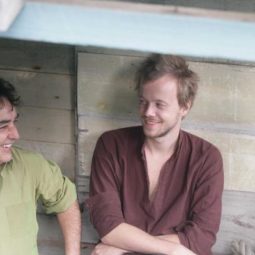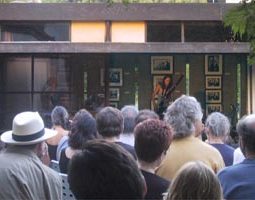One of the seminal figures in avant-garde music, Frith chose long ago not to worry about being accessible, understood, or even appealing. For 30 years or so, he has pushed and kicked the edges of rock, jazz, and improvised music out and into each other. From the high art rock band Henry Cow in the late ’60s, to the avant-thrash contortions of John Zorn’s Naked City 20 years later, to his most recent chamber-improv tour with koto player Miya Masaoko and saxophonist Larry Ochs, Frith has ceaselessly explored the possibilities of artistic musical expression.
Frith is explained, sort of, in Step Across the Border, a film by German directors Nicholas Humbert and Werner Penzel.
The films builds an eloquent case for a whole new way of looking at, listening to, performing, and thinking about music, and does a good job of introducing viewers to one of the world’s most interesting musical personalities.
Frith was an inspiring subject for Humbert and Penzel, who created this beautiful, feature-length film based on his musical and geographic peregrinations over several years. Filmed entirely in black-and-white, the film roams among studios, fields, concert halls, trains, homes, cafes, landscapes, bridges, and automobiles, both expressing and revealing Frith’s constant search for musical ideas amid the sounds of the worlds he visits.
Then there is the music, performed by Frith and the musicians he meets in his travels. Saxophonist John Zorn, guitarist Arto Lindsay, drummer Joey Baron, and the late cellist Tom Cora, among others, are seen in New York; a number of musicians from Japan, Romania, and elsewhere also turn in stunning performances, sometimes only watched with awe by Frith. These scenes reveal the film’s true subjects: not Fred Frith, but sound and music. – Trey Hatch
Awards: European Film Award, 1990; Golden Gate Award, 1991; Innovative Cinema Prize, 1991.
1990, 35mm, b&w/so, 90m
Film begins at 7:00 p.m.
Werner Penzel was born in 1950 and grew up in the South German countryside. In the late 1960s he played music and wrote poetry before turning to moviemaking in the early 1970s. He worked with the Brazilian theatre company Oficina, studied at the Munich Film School and traveled through South America, North Africa, India and Japan. After Vagabunden Karawane (198O), Adios al Odio (1986) and other movies he founded Cine Nomad together with Nicolas Humbert in 1987 through which they produced and directed, in addition to Step Across the Border, Middle of the Moment (1995) and the film triptych Three Windows-Hommage à Robert Lax (1999).
Nicolas Humbert was born in 1958; his writings, pictures and Super-8 films were influenced by French Surrealism. He co-founded the ‘Groupe Macsom’. In 1980-82 he devoted himself to painting. In 1982-87 he studied at The Munich Film School. Since then has worked as a freelance writer and film director. Before founding Cine Nomad with Werner Penzel, he directed the feature film Nebel Jagen (1985) and the documentary Wolfsgrub (1986). In addition to his collaboration with Werner Penzel, he made an experimental film, Vagabonding Images (1998), with Simone Fürbringer. See www.cinenomad.de for more information



